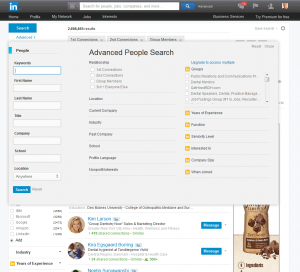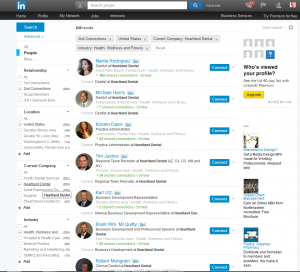
Landed a job? Great! Have you thought about a letter of resignation, an exit interview, and future communication with your patients?
You certainly aren’t usually required to submit a letter of resignation, but it does speak to your professionalism and can help you maintain a positive relationship and smooth transition between you and the person that replaces you.
Exit interviews can do the same and you should seek for them, regardless of what you want to share.
What about your patients – should they be notified? Can you notify them? Good questions. Today I am going to address all three issues.
Letters of Resignation and Exit Interviews
Simplicity is the hallmark of a good letter of resignation. Keep it professional, courteous, and, most importantly, direct and to the point.
But it’s also about tone. Don’t dump, or even imply, all your negative feelings and experiences on paper. It’s not necessary and you are, in effect, creating a permanent record about something that may change over time or can get hashed out in person before you leave.
If you have things to get off your chest, do it in person. But even if you don’t, request an exit interview with your employer where you can better express your appreciation or frustration, as well as feedback about the state of the office.
Generally, most employers like exit interviews because the employee feels more confident in giving constructive feedback. It also gives the employer an opportunity to respond, creating a more meaningful, productive (frank or feel good) discussion that is cathartic for you and helpful for them. A lengthy letter only provides for one side of that and the tone can be misinterpreted.
Remember, the dental community is competitive but often friendly and very well connected. You could really do your career a lot of damage if you handle your resignation and exit the wrong way.
Again, the main advice here is to keep everything positive – even frame your problems with the doctor or office in a positive, pleasant, and non-sarcastic tone. Very little, if anything is gained (and much can be lost) if you leave your interactions and communications in a heated or frustrated manner.
Letter of Resignation Anatomy
Overall, leave them with the impression you are a true professional by heading the advice already given to keep it short and positive.
- The first paragraph should focus on the subject at hand – leaving the office. The letter’s tone should be professional and direct. Open with the fact you are leaving, and include the date of your final day.
- Paragraph two is a very brief opportunity to share the reason for departure (I recommend keeping it vague such as “seeking a new opportunity” or the like), and thank them for the opportunity. You could also add something along the lines that you hope your professional relationship with the office can continue.
- The final paragraph should leave them with forwarding information, where you can be contacted or have final paycheck mailed to, if necessary.
You could even offer to help hire and train your replacement, if the timing works out. But don’t over-promise on it if you legitimately are not going to be available because if you offer and then don’t follow through it won’t make you look very good.
Anatomy of an Exit Interview
Exit interviews can be of any length, but try to keep it between 15 and 30 minutes. There’s no way you are going to get everything out on the table – and many employers want to know more about big pictures and trends anyway.
Like most constructive conversations, start with something sincerely positive so that the interview gets off on the right foot and the employer is open to anything negative or critical you want to discuss. Sure, you may not have much that’s positive and could just go right into everything bad, but the employer is less likely to accept it and it could turn confrontational.
Once you’ve set the tone for the meeting and have shared some positives, it would also be appropriate and positive to share with them how the experience has made you a better hygienist. Then, to finish off your points, share with them maybe the top three biggest areas where improvement at the office can be made.
You could get into specifics, but only as examples. I think most employers are more concerned about big pictures and trends and will be more likely to respond to those in a way that creates some change for the office.
Giving Notice
The standard resignation is to give an employer at least two weeks notice – this can be extended if you feel the circumstances warrant it. But be sure that the date on your letter and the final date are clearly stated so that there is no confusion.
Don’t use phrases like “planning to leave in a couple weeks” or “when you have found a suitable replacement I will move on.” You want it to be definite and specific. If you leave it open ended, you really don’t know what you will get yourself into – could be a mess.
When selecting a timeframe, and along with what you told your new employer, remember the office needs enough notice to seek a new team member to fill your position, and other paperwork needs to be completed before you leave. If you live in a small community and there aren’t as many hygienists around, you might want to consider giving a little more time.
What About Contact with Former Patients?
Here and there, I get asked by hygienists about contacting patients they saw at that office. This is very sticky – and no one situation is going to be exactly the same. Some doctors are very very protective (for good reason) of their business and could really be hurt financially with your departure.
Right up front, however, I would highly recommend you discuss this topic with your employer so that intentions are well understood. The last thing you want is for the employer to perceive falsely that you are trying to “steal” or influence their patients away from them, which can easily be concluded because patients are often very loyal to hygienists (something all doctors would do well to acknowledge).
At the end of the day, respect your employer. Regardless of how bad your relationship may be with them or how good your relationship is with your patients, you really shouldn’t (without the employer’s permission or awareness) engage in efforts to lure patients away.
Having said that, if you are approached at the grocery store it’s generally within your right to let a patient know that you have left and where you went (unless you signed a contract that prohibits that or similar actions – which would be rare).
Likewise, an office should be willing to disclose to an inquiring patient that you have left and where you went or how to contact you. Unfortunately, these two things don’t always happen due to fractured relationships – but it should be the ideal and each party should behave ethically and always take the high road, even when wronged.
Summary
Take great care in your departure from an office. There are definitely some things you can do or engage in that will leave a foul taste with your employer – and that can do real damage to your career. But you can and should try to leave on a professional high note, regardless of the overall relationship was when working together.
Bonus Tip: Unless you have a damaged relationship, ask for a letter of reference or short testimonial when you leave every job. They may come in handy down the road, and I wouldn’t just ask for one from your boss. Get one from your co-workers, too. They provide valuable third-party insight of how great you are to work with.








